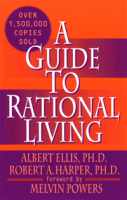A Guide to Rational Living

Notes from the Philosopher’s notes version of: A Guide to Rational Living by Albert Ellis & Robert A Harper
You may reduce your depression by using drugs or relaxation techniques, but unless you begin to think more clearly and surrender some of your Irrational Beliefs, you will tend to depress yourself again when you stop the drugs and exercises.
Insisting that things ought to go smoothly, that mishap “must not” occur, and that the important people in our lives should behave as we have told them so many times we need them to behave… is fundamentally irrational.
Yet, as a species, we naturally tend to think in these distorted and self-defeating ways.
Action -> Belief -> Consequence
It’s not our life events (Actions) that directly disturb us (produce unpleasant emotional Consequences). It’s our irrational demanding: our shoulds, oughts, and musts (Beliefs), that largely do the job.
Let us emphasize that we do not believe that any human can, for any length of time, feel perfectly or completely happy. Your frantic search for a perfect anything, in fact, almost dooms you to misery.
Positive thinking allows you to create rational coping self-statements and images that aid your goals and enhance your life. However, it is limited, and sometimes even dangerous, because you can easily use it unrealistically and poly-anna-ishly.
Thus, you can positively tell yourself, “I can accomplish anything I want!” But, of course you can’t. You can enthusiastically think, “Everything will happen for the best.” But, alas, it won’t.
Positive thinking often covers up and doesn’t really remove your underlying negative thinking.
Emotional disturbance often consists of taking a healthy wish for approval and turning it into an unhealthy demand. Then refusing to do much to win it
Misery, in other words, consists of two fairly distinct parts:
1.) desiring, wishing, or preferring that you achieve some goal or purpose and feeling disappointed and irritated when you do not achieve it; and
2.) demanding, insisting, commanding, and necessitating that you achieve your goal or purpose and making yourself feel bitter, enraged, panicked, despairing, and self-drowning when you do not.
You may sanely choose to feel strongly annoyed or irritated by frustrating conditions. But you need not make yourself feel very enraged or self-pitying about these defeats. While your feelings of loss or grief are healthy reactions to distinct loss, your feelings of panic or depression are not.
To modify your destructive habits, you’d better think and act.
Deliberately work against the influence of the past; force yourself, for example to act toward your father in a more adult fashion, to risk his disapproval, to say and do things that you previously would have been panicked to do. If you never in all your life talked to a stranger on a bus, went to a party alone, kissed a partner on your first date, or did similar things that you would like to do, force yourself until you keep trying these terrible fearful acts.
Don’t just think: act!
You can overcome years of past anguish and inertia by days or weeks of forced practice today.
We can actually put the essence of neurosis in a single word: blaming—or damning. If you would stop, really stop, damning yourself, others, and unkind conditions, you would find it almost impossible to upset yourself emotionally—about anything. Yes, anything.
Your present behaviour largely stems from your thinking. So by determined rethinking and practice, you can regulate and control your activities of today—and also prepare for an improved future.
People rarely feel particularly happy or alive when inactive except for short periods of time between their exertions. Although they may get tired and tense when continuously on the go, they are easily bored and listless when they constantly rest.
Passive enjoyments, such as reading, play-going, or watching sporting events, are often entertaining and relaxing. But a steady diet of this kind of activity often leads to dullness and apathy. Intelligent people tend to require vitally absorbing activity to stay most alive and happy. They rarely are enthusiastic for any length of time unless they have some rather complex, absorbing, and challenging occupations or interests.
‘A Guide to Rational Living’, Ellis, Albert & Harper, Robert, Wilshire Book Co., 1997
Download all Philosophers Notes on MP3

![Reflecting on Following my Heart [Ramble/Blab] [Video]](https://old.pennybutler.com/wp-content/uploads/2015/11/follow-heart1-777x437.png)
![[Q’uo] You are here to Be You](https://old.pennybutler.com/wp-content/uploads/2017/08/live-your-essence-be-you.jpg)
![[QA] Slavery, Modern Society, Victim Mentality](https://old.pennybutler.com/wp-content/uploads/2015/05/socialmedia-discussions.png)